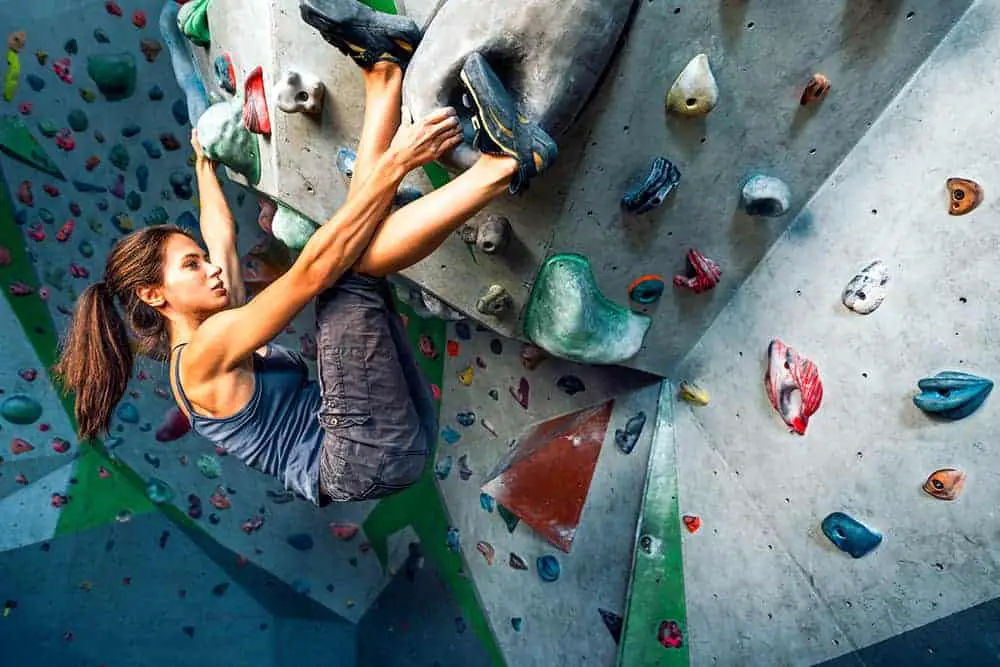I’ve noticed in the last month or so of not being able to go climbing (pandemic induced withdrawal) that I may be addicted to climbing.
Climbing, just like many other exercises, creates endorphins and stimulates the release of dopamine, norepinephrine, and serotonin.
It’s no wonder that we notice a difference in our mood and wellbeing after a climbing session.
Addiction to chemical compounds is incredibly serious/complicated and I don’t want to take away from that by writing about this. But I did find it peculiar how easy it was to find clear parallels between how I feel and many other climbers feel about climbing and addiction.
While doing research on the topic, I found a serious article on Bustle about the signs of addiction and wanted to share that with you along with the similarities that many climbers will recognize.
Especially #9. I feel like I’ve been using climbing as a way to destress and reach a zen/flow that I don’t get from any other activity.
You Keep Doing It Even Though There Are Clear Negative Consequences
According to bustle, the number one sign that you may be addicted to something is that you do it despite the negative consequences.
Of course, in climbing, we do many things despite the consequences. Not including safety (because driving a car can be just as safe…)
You climb despite your hands have flappers and tears. How many times have you just taped the flapper down and kept climbing? And then the next day, despite it hurting and you know it needs rest to heal, you climb again…
You climb despite your feet aching from cramming them into shoes that don’t fit. You can literally google search climbing feet and find the nastiest pictures of what happens to your feet when you cram them into little shoes. None-the-less, we still cram our feet into our shoes. (Check out this article for how your shoes should fit)
You Pass Up Social Situations Where You Can’t Partake
How many times have you decided to go climbing instead of an activity that doesn’t include climbing?
One of my most common situations like this is skipping a friend’s house-warming party or brother’s Harry Potter party because it’s at the same time as my regular climbing session.
Or even more likely, you skip a game night on Saturday because you are traveling to a new crag and won’t be able to make it back in time…
You Suffer Withdrawal If You Attempt To Stop
According to research published in the National Library of Medicine, rock climbing athletes appear to experience withdrawal symptoms when abstinent from climbing comparable to individuals with substance and behavioral addictions.
If you feel depressed or anxious when you miss your climbing session, then you are probably going through some sort of withdrawal.
Scrolling through social media and watching old climbing videos or liking pictures of people on a route that you’ve never heard of is so sad and it definitely doesn’t help, but it’s also something that has been super common for those of us that are isolated for COVID-19.
Or, something that has been difficult for me, you may be considering throwing your deposit on your apartment away so that you can build an at-home wall. Which would hopefully be the bargain you need for feeling better.
You Attempt To Keep Your Use Secret
When we first get into climbing, the subject probably snuck into every conversation. However, after many of your friends and family point out that climbing is either unsafe or without saying it, suggest it isn’t as cool as you think, you’ll probably become more careful with who you tell.
For example, you may stop talking about climbing to your parents because you don’t want them to know it is the only thing you think about.
Your Tolerance Is Increasing
That satisfaction and exhilaration you felt when you climbed your first V1, becomes more difficult to achieve, the harder you climb. And thus, you have to climb harder and longer to get the same satisfaction.
Though being able to climb harder and longer is a feat in climbing and it is a great way to improve your climbing performance, it is also an indication that your body is becoming more tolerant to it, and requires more of it to get the same chemical produced when you first started climbing.
Something else to consider is that feeling of “comfort” when considering the risk you are taking. For example, as you may have seen in Free-Solo, (watch it on prime here), climbers’ minds may become more “numb” (for lack of a better word) to fear.
You Can’t Seem To Stop Yourself
Even when things come up that are important and require your time and attention, you find a way to rearrange your schedule and dismiss invitations to other events that would interfere with your regular climbing sessions.
You Take Risks And Make Disproportionate Sacrifices For It
Risk is no stranger to climbing. The more comfortable you become with climbing, the more risks you will likely make to get to the next handhold or send your project.
The risk of falling and breaking your chin open (yes, it happened and it hurt a lot but for some reason, I still climb…) doesn’t seem to matter when you consider the way you will feel when you send that climb.
You Make Excuses When Other People Act Concerned
You probably already have a canned response for when someone asks you “isn’t it dangerous to climb.” For me, I usually say something along the lines of “there are many safety precautions to help prevent injury” or “yes, but no more dangerous than any other sport, especially contact sports.”
And you probably already have made hundreds of excuses to friends and family that may have shared their concerns about your climbing adventures or obsession.
You Feel You Need It To Deal With Your Problems
This was something that really stood out to me. I have a deep sense that climbing helps me destress and work through anything that may come up in my life. It has already proved to be a great way to get into a zen or flow state and that feeling continued for a period of time after the session as well.
For example, when my grandpa died, I used climbing to help me process everything emotionally and mentally. I probably doubled the amount of time I spent at the climbing gym because I felt a sense of zen or flow while climbing.
Final Thoughts
Climbing, like many other sports, creates endorphins that make it easy for you to become somewhat addicted to climbing. It’s different, however, in that the satisfaction and zen that you get is unparalleled with any other sport or exercise or activity.
This makes climbing even easier to parallel with the serious signs of addiction outlined in the Bustle article.
The majority of climbers don’t have to worry about the negative consequences of their climbing addiction. However, I can’t finish this article without mentioning that if you are addicted to anything, there is help available to you.
More Trending Topics Like This:
- What Happened During The Men’s 2021 Climbing Olympics?
- Who Are The Climbers Competing In The Tokyo Olympics 2021?
- Is Climbing A Sport?
- How Many Calories Do You Burn From Climbing?
- 17 Reasons Why Bouldering Is So Popular
- The Evolution Of Climbing Belay Devices
- 23 Storage Ideas For Your Climbing Gear
- Why Is Climbing Such A Mental Sport?
- The Best Way To Take Climbing Chalk Through Airport Security
- Is Bouldering That Hard? Yea, It’s Hard – This Is Why
- Is Climbing Considered A Sport
- Is Climbing And Bouldering Good For Cardio?
- Top 10 Home Climbing Gym Designs
- 9 Signs You’re Seriously Addicted To Climbing
- Why Do People Like Climbing?
- What You Need To Know About Climbing In The 2021 Tokyo Olympics
- Can Climbing Build Abs And Make You Look Chiseled
- How To Introduce Your Friends To Climbing (15 Steps)
- Tips For Handling Your Period While Climbing
- Is Bouldering Outdoors Harder Than Indoors?
- Can You Go Rock Climbing Outdoors During The Covid 19 Pandemic?
- 7 Reasons To Wear Socks With Climbing Shoes
- What Is Dabbing? | Climbing Vocabulary And Culture
- Bouldering Vs Climbing: Training, Skills, Strength, Grades
- Indoor Vs Outdoor Climbing: A Thorough Comparision
- 22 Health Benefits Of Climbing – Backed By Research
- Bouldering And Sports Climbing Glossary: Lingo And Language
- Quick Tips For Getting Back Into Climbing After A Long Break
- 10 Legit Reasons You Should Not Rock Climb
- Can Climbing Build Muscle And Replace Weight Training?
- Do You Wear Socks With Rock Climbing Shoes?
- Is Bouldering Dangerous?
- What Should You Record In A Climbing Journal?
- How Are Climbing Routes Graded?
- First Time At The Bouldering Gym – What You Should Know
- 7 Common Mistakes In Rock Climbing For Beginners
- How Do Alpinists Get Down?

